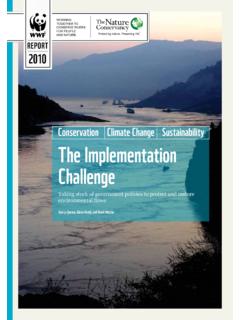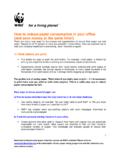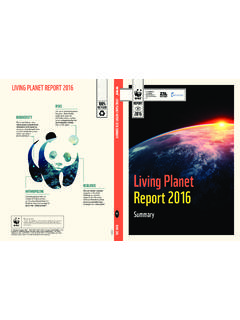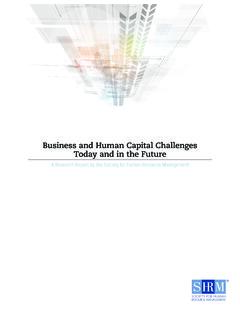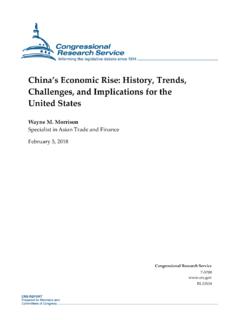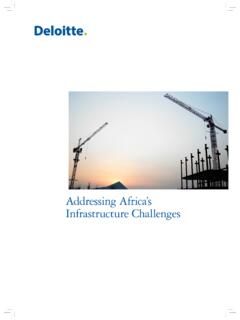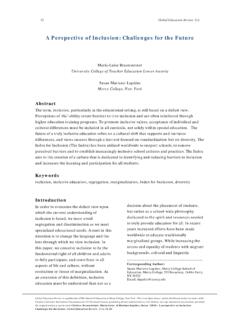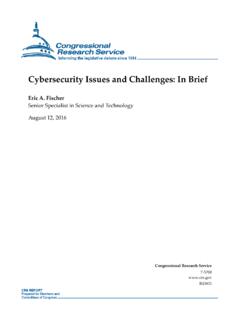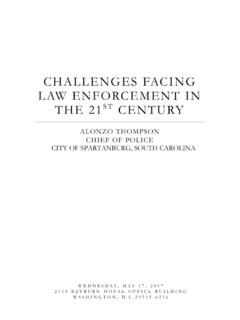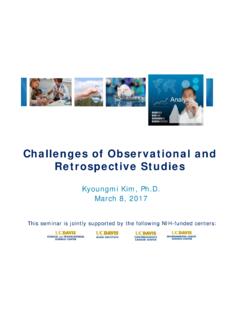Transcription of WATER STEWARDSHIP - Panda
1 WATER STEWARDSHIP2013 BRIEFP erspectives on business risks and responses to WATER challengesWater STEWARDSHIP | 1 WWF has worked on freshwater conservation for decades. Over that time, we have evolved and expanded our programmes to meet changing WATER problems of governance, scarcity and pollution have spread and intensified, interest in protecting WATER has diversified. More than ever before, business leaders realize that their long-term profitability even viability depends on the right quantity and quality of WATER available at the right time and place to meet the needs of people, business and ecosystems. This business interest triggered the creation in 2008 of WWF s WATER STEWARDSHIP Programme. The concept of WATER STEWARDSHIP serves to unite a wide set of stakeholders interested in WATER management. In common usage, it often refers to business action on WATER challenges.
2 In this brief we are using the term in this common sense, as it relates to business while acknowledging that there is no universally agreed definition. WWF is a strong advocate for responsible private sector engagement on WATER issues, and has long worked with companies in watershed protection. We are excited by the increased interest in WATER from business and appreciate that good STEWARDSHIP does exist. Yet, we are witnessing a mixed response from many companies, including weak and unsubstantiated claims around their engagements in STEWARDSHIP , inconsequential efforts, meaningless targets and ad hoc strategies to address WATER challenges. While that is a harsh assessment, it is simply a reflection of the significant confusion about the issues and how to respond, and too often, a loose interpretation of the term and concept of WATER STEWARDSHIP .
3 Why does it matter? Projections on the future of freshwater mean that we face increasingly difficult choices as we strive to meet our needs for food, energy and WATER , while maintaining the other services that freshwater ecosystems deliver. Optimizing WATER use for one sector can have dire consequences for others and history tells us that nature will usually draw the short straw. We define WATER STEWARDSHIP for business as a progression of increased improvement of WATER use and a reduction in the WATER -related impacts of internal and value chain operations. More importantly, it is a commitment to the sustainable management of shared WATER resources in the public interest through collective action with other businesses, governments, NGOs and 1 INTRODUCTION 3 PART A WHy STEWARDSHIP ? 8 Context of a changing WATER world for companies 8 Business Risk 10 Leadership 12 Assessing risk 13 PART B FACIlITATING STEWARDSHIP 14 PART C THE GOOD, THE BAD AND THE UGly 20 What are the real debates in STEWARDSHIP going to be?
4 22 A call to action 22 What will WWF be doing in WATER STEWARDSHIP ? 24 FINAl STATEmENT 28 REFERENCES 29 WWF is one of the world s largest and most experienced independent conservation organizations, with over 5 million supporters and a global network active in more than 100 s mission is to stop the degradation of the planet s natural environment and to build a future in which humans live in harmony with nature, by conserving the world s biological diversity, ensuring that the use of renewable natural resources is sustainable, and promoting the reduction of pollution and wasteful consumption. Front cover: / Visuals Unlimited / WWF-CanonPublished in August 2013 by WWF World Wide Fund For Nature (Formerly World Wildlife Fund), Gland, Switzerland. Any reproduction in full or in part must mention the title and credit the above-mentioned publisher as the copyright owner.
5 Text 2013 WWFAll rights reserved BACKGROUND2 | WATER StewardshipWater STEWARDSHIP | 3As our shared WATER resources face ever greater demands, using and polluting less may not ensure sufficient WATER for all of our needs and desires including economic growth. WWF does not want to see effort wasted pursuing dead-ends and ineffective approaches; nor do we want to see greenwash in business WATER responses or dilution of the term WATER STEWARDSHIP . Therefore we believe it is time for us to put a stake in the ground as to what we think is worthwhile and what is brief is for anyone interested in better understanding the concept of WATER STEWARDSHIP as defined by WWF. We base our definition on insights gained from our contributions to many of the aspects that make up WATER STEWARDSHIP . These include river basin management, WATER footprinting, risk analysis and metrics, STEWARDSHIP strategy, public policy guidance, standards development and partnerships with companies in stressed watersheds.
6 We have outlined our definition of risk and footprint in previous publications, a list of which you can find at the back of this WWF?A brief on WATER STEWARDSHIP could be written by any number of business consultancies or other entities; each would bring its own perspective. At WWF, we care about ecosystem health because we understand that healthy ecosystems are essential for human well-being. And the ecosystems that supply humanity s WATER that most essential of resources are taking a beating. The Freshwater Living Planet Index (WWF, 2012) tracks the changes in 2,849 populations of 737 species of fish, birds, reptiles, amphibians and mammals in tropical and temperate freshwater ecosystems. These data are used to calculate an index that shows trends in the state of freshwater systems relative to a 1970 baseline. Globally, this index has declined by 37 per cent since 1970, a greater decline than has been seen in either marine or terrestrial ecosystems (Figure 1).
7 The tropical freshwater index declined by a much greater extent (70 per cent) over this period. There is some optimism in the improved state of freshwater in temperate zones (36 per cent increase), demonstrating that trends can be reversed with the right policies and interventions. It is precisely the aim of WATER STEWARDSHIP to foster the kinds of policies and interventions that enabled the positive trend in temperate freshwater ecosystems. To address our shared WATER challenges, WWF has over 370 staff in 65 countries solely dedicated to national and regional WATER issues. These teams recognized a long time ago that addressing the trends in species decline and meeting societal needs means -70%THE TROPICAl FRESHWATER INDEx DROPPED By 70% SINCE 1970 INTRODUCTION4 | WATER StewardshipWater STEWARDSHIP | 5we must engage decision-makers and the drivers of these trends.
8 WATER STEWARDSHIP , if done well, now provides a new lever to affect positive change through companies and investors. The alternative not engaging with the companies and investors active in the places we care about is simply not an option. Given the world s spiraling WATER challenges, the underwhelming implementation of integrated WATER resource management and the lack of government investment in WATER , we must explore all potential avenues for change. We recognize that business engagement in WATER management debates, and especially public policy, provokes significant concerns from some NGOs and the public, including fears about business takeover of global resources. At the core of these concerns are two issues: 1. WATER is a highly complex public resource with multiple socially defined functions and values. Its effective management requires the continual reconciliation of trade-offs between private interests and collective well-being, not to mention fulfillment of a fundamental human right.
9 2. Although they must have regard to wider social and environmental interests, many companies are legally obliged to prioritize a narrow set of shareholder interests (Newborne and Mason, 2012). To ensure that the profit motive of companies is balanced with social and environmental values, WWF and others must be able to separate WATER STEWARDSHIP rhetoric from substantive action, and challenge and measure company participation in ways that benefit more than just the near-term financial bottom 1 Living Planet Index for Freshwater EcosystemsSource WWF, 20121980 1985 1990 1995 2000 2005 2008 Year 1970 1975 Index Value (1970 = 1) +36%-70%Confidence limitsTemperate freshwater indexConfidence limitsTropical freshwater indexTo ensure that the profit motive of companies is balanced with social and environmental values, WWF and others must be able to separate WATER STEWARDSHIP rhetoric from substantive action.
10 WWF-PakistanlEvERAGING THE lITTlE GUyS IN PAKISTAN Frequently, it s multi-national companies with well-known brands that get the STEWARDSHIP spotlight. Yet, it s small and medium enterprises that often face the greatest WATER risk. These companies can t simply move out of a WATER -scarce basin; if they close a facility, they close up shop. With so much on the line, these companies have a compelling reason to engage in WATER STEWARDSHIP . In Lahore, Pakistan, WWF and partners are supporting improvements in the sustainability of production practices, with a particular focus on WATER use, WATER management and wastewater discharge quality in WATER -intensive, urban small and medium enterprises. In addition to inside the fence-line improvements, the participating companies will engage with policymakers and institutions to encourage interventions that reduce their collective WATER | WATER StewardshipWater STEWARDSHIP | 9 CONTExT OF A CHANGING WATER WORlD FOR COmPANIESW ater is a resource under increasing stress, and its management is now recognized as one of the key societal, environmental and sustainability challenges of the 21st century (WEF, 2012).
